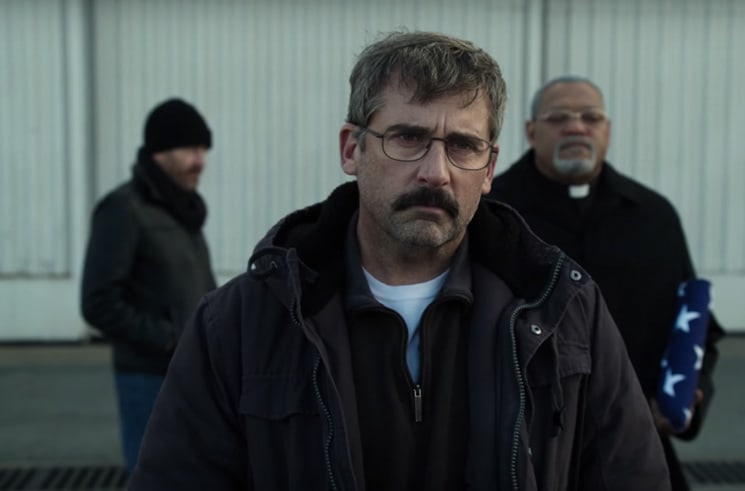The journey has always been more interesting than the destination for Richard Linklater. His best movies emphasize winding conversations that leave no conceptual corner unturned (first with 1991's Slacker, and later with the Before trilogy) and loose storylines you wish would never end (1993's Dazed and Confused and spiritual sequel Everybody Wants Some!!).
His latest film, Last Flag Flying — a sometimes comedic drama about three Vietnam War veterans tasked with transporting and burying one of their sons (who died overseas during the Iraq War) — is his first movie about the subject of war, and although Linklater tackles important topics related to grief, honour, courage and, pointedly, the American government's consistent attempts to cover up information throughout the film, it's also his first work in a while that lacks real depth.
Co-written with Darryl Ponicsan (the film is a sort of sequel to his 1973 film The Last Detail), Last Flag Flying is a meandering road movie that doesn't cover a lot of ground despite the amount of time spent watching its three main characters — Doc (Steve Carell), a grieving father who also recently lost his wife; Mueller (Laurence Fishburne), a reverend trying to keep his past behind him; and Sal (Bryan Cranston), a struggling bar owner with an alcohol problem who can't keep his mouth shut — traverse the Eastern Seaboard and surrounding area.
Part of the problem has to do with the characters and their backstories — or lack thereof. In Before Sunrise, audiences connected with Jesse and Céline the moment they met, and only grew to love them as their pasts unfolded over many conversations (some of them decades later). Here, the chemistry isn't fully there; sure, all three harbour a secret about the death of a fellow soldier that's never fully revealed, and Sal and Mueller are racked with guilt over a situation that landed Doc in the brig near the end of the Vietnam War, but things don't even seem to click in the film's happier moments, when the trio's camaraderie truly shines.
Because of this, the actors seem to overcompensate in their roles: Cranston is crass and hammy; Fishburne is judgemental at his most pious and outlandish in the moments he finally breaks loose; and Carell, whose character has the most to be angry about, is quiet and reserved throughout.
It's an odd trio of performances from three masters of their craft, and one of the more unnatural movies from a filmmaker known for his realism.
(VVS Films)His latest film, Last Flag Flying — a sometimes comedic drama about three Vietnam War veterans tasked with transporting and burying one of their sons (who died overseas during the Iraq War) — is his first movie about the subject of war, and although Linklater tackles important topics related to grief, honour, courage and, pointedly, the American government's consistent attempts to cover up information throughout the film, it's also his first work in a while that lacks real depth.
Co-written with Darryl Ponicsan (the film is a sort of sequel to his 1973 film The Last Detail), Last Flag Flying is a meandering road movie that doesn't cover a lot of ground despite the amount of time spent watching its three main characters — Doc (Steve Carell), a grieving father who also recently lost his wife; Mueller (Laurence Fishburne), a reverend trying to keep his past behind him; and Sal (Bryan Cranston), a struggling bar owner with an alcohol problem who can't keep his mouth shut — traverse the Eastern Seaboard and surrounding area.
Part of the problem has to do with the characters and their backstories — or lack thereof. In Before Sunrise, audiences connected with Jesse and Céline the moment they met, and only grew to love them as their pasts unfolded over many conversations (some of them decades later). Here, the chemistry isn't fully there; sure, all three harbour a secret about the death of a fellow soldier that's never fully revealed, and Sal and Mueller are racked with guilt over a situation that landed Doc in the brig near the end of the Vietnam War, but things don't even seem to click in the film's happier moments, when the trio's camaraderie truly shines.
Because of this, the actors seem to overcompensate in their roles: Cranston is crass and hammy; Fishburne is judgemental at his most pious and outlandish in the moments he finally breaks loose; and Carell, whose character has the most to be angry about, is quiet and reserved throughout.
It's an odd trio of performances from three masters of their craft, and one of the more unnatural movies from a filmmaker known for his realism.




